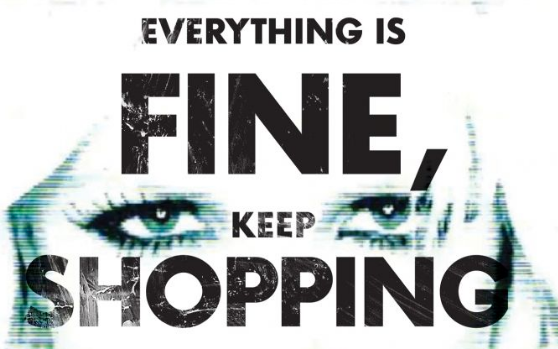It’s that day again. That hallowed time of year when the whole family comes together to hit up Amazon Prime, max out the MasterCard and quite literally beat off the competition at the local mall’s big annual sale. It’s a day where love abounds: love for gadgets, for giant teddy bears and kinky lingerie, all provided for by the magic of globalisation, that mysterious force we love to hate to love. By now Black Friday has become more than a cliché. It’s a defining ritual of our age, the pre-advent party for a secular bubble-wrapped Christmas.
It’s easy to laugh at the degrading spectacle, as mobs of usually pretty poor people slobber over flat screens or beat each other with baseball bats to get at that last pack of Star Wars Lego. In fact it’s undeniable: the endless YouTube compilations are a far cry from what we usually think of as civilisation. Over the centuries we humans have proved we can cooperate pretty well – how else did we take down those woolly mammoths? – but there’s always the danger, seemingly intrinsic to our nature, that more insidious drives take control every now and then. Black Friday is like the real-world version of J.G Ballard’s dystopian High Rise, where our carefully curated Facebook superego makes way for the anarchic shadow of the id.
The mania, though, isn’t confined to the day or increasingly the week itself, but reveals itself in all kinds of other moments. The London riots in 2011 were a particularly overt example of how deeply engrained the need to simply have stuff for the sake of it has become. I remember in the midst of the chaos of burning vehicles some guy with a crow bar was interviewed by a citizen journalist outside PC world. “Why are you doing this?” asked the breathless interviewer, “What do you mean why? There’s free stuff!” laughed the man, as all around him people stole each other’s bikes. Years later, on another more typical but equally black weekend somewhere else in suburban England, Tesco customers wrestled on the floor to claim discount meat while passers-by took videos on their smartphones.
Black Friday is everyone’s burden, all of the time. Online and offline 24/7 we have adverts projecting stuff into our heads about what it means to be comfortable and satisfied. We want – need – these things to be happy and sometimes, whether in fantasy or reality, just to survive. This is a collective psychic state, not a choice.
How would your loved ones feel if you got them a homemade gift this year? It’s the thought that counts, sure, we’ve heard it all before, but let’s be honest, it’s still better to turn up on December 25 with an iPad or a PS4 or some noise cancelling headphones than a box of origami or an improvised bath bomb. The problem of course is that most of us just don’t have the money. Wages are going down, contracts are getting shorter. It’s not some complex equation. It makes total sense to win out in those sales – to earn the deals through planning, dedication and, if necessary, physical combat.

This unpalatable but ultimately rational truth is why magazines like adbusters and all the similar anti-capitalist ‘boycott’ campaigns are so embarrassingly bad at propaganda. ‘Buy Nothing Day!’ What is the message exactly? That people should pay more for things they want anyway? That people shouldn’t take advantage of a rare opportunity to get the stuff they’re hooked on? In a Buddhistic sense, sure, they’re probably right, we shouldn’t be dominated by such materialistic values: but in the real world, where we are, where society actually works like this, what can you do? Sometimes these guys seem to have as much contempt for consumer-would-be-rioters as those British religious groups complaining about Greggs’ new sausage roll Jesus.
By all means let’s gawp and gasp at the silly consumer brawls, and pacify ourselves watching Dawn of the Dead, pretending we’re above it all. Many of us are, but, let’s be honest, only by a whisker. Demonizing individual shoppers as if they were rabid dogs isn’t so different at the end of the day from when David Cameron, and others, labelled London’s looters as being “totally outside of the moral norm of society”. Surely the actual point is that precisely through their extreme desperation, these people reveal the hidden face of our everyday rules. And let’s not forget the rich behave like this too. Just look at the wrestling-match madness of the stock market, the regular nihilistic vandalism of the Oxford Bullingdon club or the 100 strong mass brawl that broke out in a pub in the affluent English region of Wiltshire earlier this year.
This November as our primate selves come to the surface once again let’s not lose sight of our ancestors, those brave Neanderthals who took down terrifying beasts by working together. Or, in our actual lives, those poor people scrambling around for greyed bacon rinds on a supermarket floor. Because all of them, including the well-fed lads from that Wetherspoons fight, are our fellow humans, whether we like it or not.
*Lead image by Raúl Villalón. Flickr/Some rights reserved
![Political Critique [DISCONTINUED]](http://politicalcritique.org/wp-content/uploads/2015/09/Political-Critique-LOGO.png)
![Political Critique [DISCONTINUED]](http://politicalcritique.org/wp-content/uploads/2015/09/Political-Critique-LOGO-2.png)